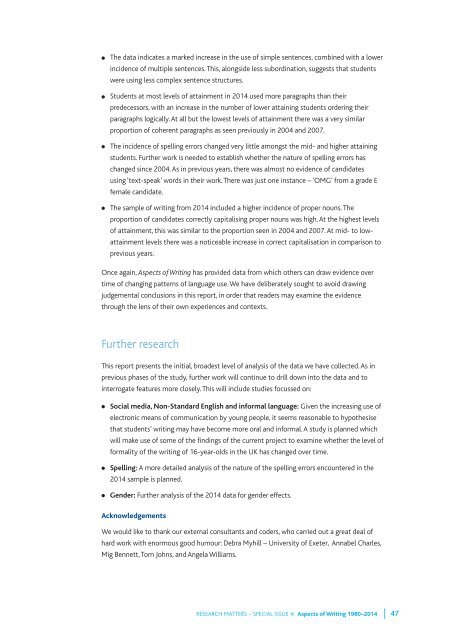Research Matters
N6fqJH
N6fqJH
You also want an ePaper? Increase the reach of your titles
YUMPU automatically turns print PDFs into web optimized ePapers that Google loves.
●<br />
●<br />
●<br />
●<br />
The data indicates a marked increase in the use of simple sentences, combined with a lower<br />
incidence of multiple sentences.This, alongside less subordination, suggests that students<br />
were using less complex sentence structures.<br />
Students at most levels of attainment in 2014 used more paragraphs than their<br />
predecessors, with an increase in the number of lower attaining students ordering their<br />
paragraphs logically.At all but the lowest levels of attainment there was a very similar<br />
proportion of coherent paragraphs as seen previously in 2004 and 2007.<br />
The incidence of spelling errors changed very little amongst the mid- and higher attaining<br />
students. Further work is needed to establish whether the nature of spelling errors has<br />
changed since 2004.As in previous years, there was almost no evidence of candidates<br />
using ‘text-speak’ words in their work.There was just one instance – ‘OMG’ from a grade E<br />
female candidate.<br />
The sample of writing from 2014 included a higher incidence of proper nouns.The<br />
proportion of candidates correctly capitalising proper nouns was high.At the highest levels<br />
of attainment, this was similar to the proportion seen in 2004 and 2007.At mid- to lowattainment<br />
levels there was a noticeable increase in correct capitalisation in comparison to<br />
previous years.<br />
Once again, Aspects of Writing has provided data from which others can draw evidence over<br />
time of changing patterns of language use.We have deliberately sought to avoid drawing<br />
judgemental conclusions in this report, in order that readers may examine the evidence<br />
through the lens of their own experiences and contexts.<br />
Further research<br />
This report presents the initial, broadest level of analysis of the data we have collected.As in<br />
previous phases of the study, further work will continue to drill down into the data and to<br />
interrogate features more closely.This will include studies focussed on:<br />
●<br />
●<br />
●<br />
Social media, Non-Standard English and informal language: Given the increasing use of<br />
electronic means of communication by young people, it seems reasonable to hypothesise<br />
that students’ writing may have become more oral and informal.A study is planned which<br />
will make use of some of the findings of the current project to examine whether the level of<br />
formality of the writing of 16-year-olds in the UK has changed over time.<br />
Spelling: A more detailed analysis of the nature of the spelling errors encountered in the<br />
2014 sample is planned.<br />
Gender: Further analysis of the 2014 data for gender effects.<br />
Acknowledgements<br />
We would like to thank our external consultants and coders, who carried out a great deal of<br />
hard work with enormous good humour: Debra Myhill – University of Exeter, Annabel Charles,<br />
Mig Bennett,Tom Johns, and Angela Williams.<br />
RESEARCH MATTERS – SPECIAL ISSUE 4: Aspects of Writing 1980–2014 | 47


